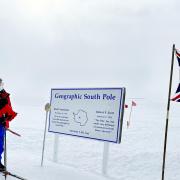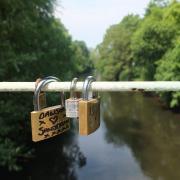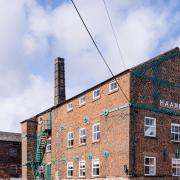Geoff Ford meets Alex Warzynski, Chairman of the British Sub Aqua Club at his home in Wirksworth

In the heart of the English countryside was not where I expected to find the Chair of the British Sub-Aqua Club. Alex Warzynski lives in Wirksworth but this, he tells me, is the ideal location from which to pursue his passion for diving among the wrecks and sea life around the British coast.
‘The great thing is that pretty much every coast in the UK is accessible. Plymouth is a four-hour drive, the Farne Islands in the North East about three and a half hours, Anglesey is just three hours away. It’s all very do-able, even places like Scapa Flow in Orkney, where the World War I German battle fleet was interred at the end of the war. They scuttled 70-odd ships and it’s pretty iconic diving up there. Even then, I can set off at six in the morning and get the four o’clock ferry, so it’s quite do-able.
Scuba (self-contained underwater breathing apparatus) diving has become very popular as a pastime for the more adventurous and, Alex says, it is becoming increasingly accessible for all. ‘The Blue Planet TV series stirred up some interest,’ says Alex, ‘but what we find now, and not just for diving but for all club-based activities, is that people want to have a go at something, put a tick in the box and that’s it, done.’ The hope is that some of them will then want to take it further, and finding a local club is a good first step. ‘There are around 950 clubs in the country as well as local branches and centres teaching it commercially. There are good clubs in Ashbourne and Belper, and Derby has a few clubs, too. Diving is a very sociable sport, it’s difficult to do it by yourself as you need to take a buddy with you in case you have a problem. Organised diving, on the coast with a couple of people, is straightforward but to get a club boat out to a site you need to be in a group of divers and have the necessary training to do it safely. It’s something you need to learn in a club environment. Plus, in a club you get all the mentoring as well.’
Alex’s interest in diving came from his father’s passion for boats. ‘My dad was a diver and there was always kit knocking around at home. He was more of a sailor than a diver but interested through having a boat and it was handy to just strap on a tank and dive in. I learned at university, with more interest in diving than sailing.’

Having moved away, Alex returned to Derbyshire in 1995 and was approached by the University of Nottingham Sub-Aqua Club to join them as an instructor. ‘Then, six or seven years ago, I was asked if I would help out at national level on the council, which is the board of directors, to bring some IT and business skills.’ After a two-year stint as Vice-chair, Alex became Chair 18 months ago. As Chair of the BSAC it was his privilege to welcome the club’s President, the Duke of Cambridge on a visit to the BSAC’s Merseyside branch last September. Prince William had taken over the presidency from his father, The Prince of Wales, in May 2014, who had in turn inherited it from The Duke of Edinburgh.
‘It was a great pleasure to welcome The Duke of Cambridge to our Merseyside branch and I know members enjoyed sharing the history of the club and its varied stories and achievements with him. It was an important day for everyone concerned and was another very special milestone in BSAC’s history. We are really privileged to have The Duke of Cambridge as our President and as a keen scuba diver, he is the perfect person to help us champion the sport both in the UK and abroad.’
Anyone who takes up scuba diving is rewarded with the revelation of a whole new world. As well as exploring some of the 40,000 shipwrecks around the British coast, there is the chance to observe a great variety of marine wildlife, ranging from the second biggest fish in the sea, the basking shark, through orcas and seals to puffins and diving sea birds.
Alex relates: ‘My family were on Thurlestone beach in Devon. We put on some scuba gear, jumped in, and they were stunned by the difference. Other kids were playing on the sandy beach, building sandcastles, yet 10 feet away there were spider crabs wandering around and a wreck, it’s a completely different world. Shipwrecks become a magnet for wildlife and with 2,000 years of maritime history there are lots of wrecks down there. Things do tend to shift and decay though. A lot of people’s first wreck dive is a liberty ship that was torpedoed just out of Plymouth and over the years it has slowly fallen to bits. The amount of life on there is incredible. Just a mile away, the National Marine Aquarium sunk an old Leander Class frigate to make an artificial reef and the speed at which it has been colonised is stunning, as is the speed at which it’s falling to bits. A couple of winter storms have had a real impact. The power of the sea is tremendous.’

Alex, also known as Woz in the diving community, speaks of his sport with an infectious passion and enthusiasm. Although to the casual observer it may look like an extreme pastime, something for the more adventurous, Alex is keen to stress just how accessible scuba diving is today. ‘Back in the 70s and 80s diving was considered macho sort of stuff, but these days it’s really accessible and relatively straightforward. In terms of fitness, as long as you can go for a Sunday walk… The stressful part is lugging your kit around, getting kitted up and then taking it off. In the water is the easy bit.
‘Saying that, we’ve recently launched a Diving for All course for those with disabilities. We have people with no legs diving and a girl with no arms who is now going open-water diving. She’s really inspiring in terms of what you can achieve and it doesn’t just help people with physical injuries. Soldiers with post-traumatic stress disorder have also found it good. It’s a pretty safe sport. Probably the most dangerous part of the dive is getting in the car and driving to the coast. I’ve been diving for nearly 30 years and the worst injury I had was falling over in the car park!
‘There’s really nothing nicer than bobbing around on a boat off the west coast of Scotland with a bunch of mates going for a dive. It’s superb!’






























